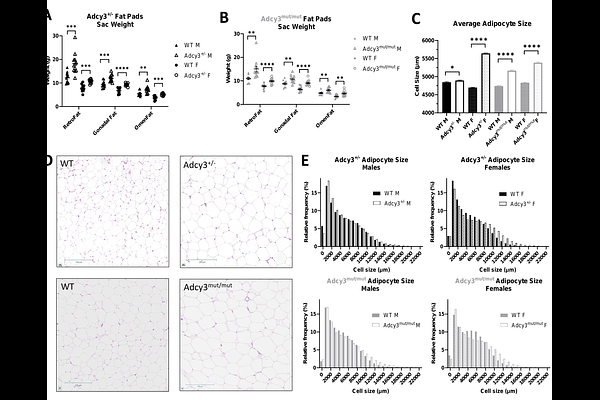Protein-coding mutation in Adcy3 increases adiposity and alters emotional behaviors sex-dependently in rats

Protein-coding mutation in Adcy3 increases adiposity and alters emotional behaviors sex-dependently in rats
Fitzpatrick, M.; Szalanczy, A. M.; Beeson, A.; Vora, A.; Scott, C.; Grzybowski, M.; Klotz, J.; Der, N.; Chen, R.; Geurts, A.; Woods, L. S.
AbstractObjective Adenylate cyclase 3 (Adcy3) has been linked to both obesity and major depressive disorder (MDD). Our lab identified a protein-coding variant in the 2nd transmembrane (TM) helix of Adcy3 in rats, and similar obesity variants have been identified in humans. The current study investigates the role of a TM variant in adiposity and behavior. Methods We used CRISPR-SpCas9 to mutate the TM domain of Adcy3 in WKY rats (Adcy3mut/mut). We also created a heterozygous knockout rat in the same strain (Adcy3+/-). Wild-type (WT), Adcy3+/-, and Adcy3mut/mut rats were fed a high-fat diet for 12 weeks. We measured body weight, fat mass, glucose tolerance, food intake, metabolism, emotion-like behaviors, and memory. Results Adcy3+/- and Adcy3mut/mut rats weighed more than WT rats due to increased fat mass. There were key sex differences: adiposity was driven by increased food intake in males but by decreased energy expenditure in females. Adcy3mut/mut males displayed increased passive coping and decreased memory while Adcy3mut/mut females displayed increased anxiety-like behavior. Conclusions These studies show that the ADCY3 TM domain plays a role in protein function, that Adcy3 may contribute to the relationship between obesity and MDD, and that sex influences the relationships between Adcy3, metabolism, and behavior.